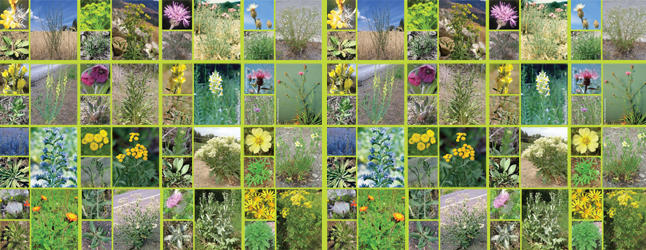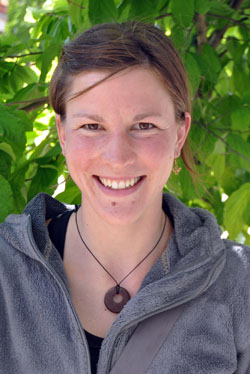

Coordinator of the
Columbia Shuswap Invasive Species Society
By David F. Rooney
Over the past several months a new organization — the Columbia Shuswap Invasive Species Society (CSISS) — has been created within our regional district to help communities come to grips with the increasing number of alien species making inroads in our gardens, meadows and forests. That nascent non-profit now has a coordinator — Natalie Stafl of Revelstoke.
A native of Eugene, Ore., with dual citizenship, Natalie conducted her Master’s research on the impact of hiking traffic and temperature on American pika foraging behaviour in the Selkirk Mountains. Natalie has worked in BC and the Yukon monitoring fish and wildlife as well as studying glacier climatology and alpine plant communities in the area. She completed her Bachelor of Science degree in 2009 from the UBC Faculty of Forestry in Natural Resource Conservation.
Getting a new non-profit society up and running is a major task and, for now, she’ll be assisted by an interim board consisting of Hamish Kassa as chairman, Chris Cochrane as vice-chairman and Joyce DeBoer as secretary-treasurer. Environmental groups in the Columbia Shuswap Regional District’s various communities will be invited to join and while the society has $50,000 in seed funding from the CSRD it will be seeking additional funds from major corporations and organizations from BC Hydro to the Columbia Basin Trust.
Besides getting set up, it needs to inventory the actual number of invasive species in our region.
“Right now we think there are about 38 invasive plant species in our region,” Natalie said in an interview last week. “But I think there are actually a lot more than that.”
The society has plans for a major event — Building Our Future — in Revelstoke on June 20 that
will teach people to:
- Identify the Top 10 invasive plants to watch out for in the region;
- Gain knowledge of biological control methods used around the province;
- Get the latest updates on what actions are currently underway to stop the spread of invasive species; and
- Help us identify the most effective role CSISS can play in this effort within the Columbia Shuswap region.
Anyone who is currently taking action to manage invasive species in the region is invited to provide a short presentation during this meeting. You can contact Natalie by phone as 250-683-9992 and by e-mail at csinvasives@gmail.com.
The CSRD has already produced a brochure cataloging invasive species. It is somewhat out of date as species such as Himalayan Orchids and Himalayan Blackberry are not included but is still useful. Click here to view the brochure.



